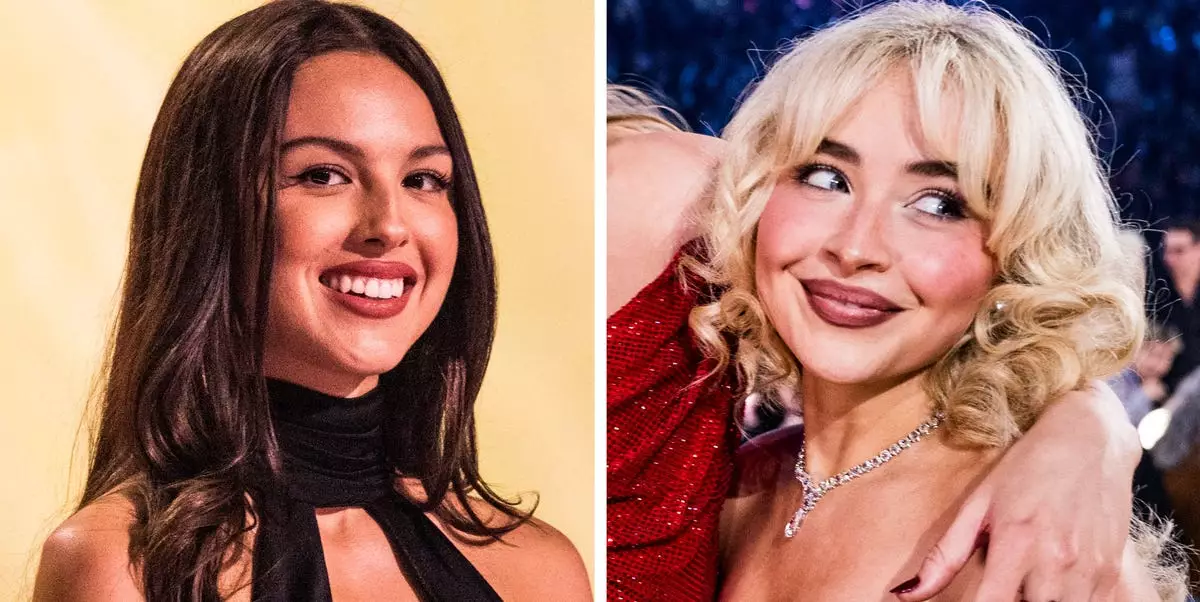The music industry is often rife with speculation, drama, and sometimes, rivalry. For pop stars Olivia Rodrigo and Sabrina Carpenter, their early connection was marred by unnecessary comparisons and narratives that revolved around their shared romantic involvement with Joshua Bassett. However, as showcased at the 2025 Grammys, they have seemingly moved past their turbulent history, signaling a new chapter in their lives that champions friendship over fracas.
At the recent Grammy Awards, a highly celebrated event in the music world, the sight of Rodrigo and Carpenter engaged in conversation captured the attention of fans and media alike. Observers noted the warmth between the two, a stark contrast to earlier years when they were drawn into public disputes. Any past animosity seems to have dissolved, allowing the two artists to focus on their present and futures without the shadows of the past looming over them. Their interaction during such a prestigious event speaks volumes about their personal growth and evolving relationship.
Olivia Rodrigo arrived at the Grammys with her new boyfriend, Louis Partridge, and the couple was spotted enjoying affectionate moments, suggesting that Rodrigo is thriving both personally and professionally. Carpenter, on the other hand, emerged victorious with her first Grammy wins, including the prestigious award for Best Pop Vocal Album. The celebration of her achievements adds to the narrative that both women are carving out their own paths in the music scene, unencumbered by their earlier rivalry.
Public Perception vs. Personal Realities
Reflecting back on the initial drama that surrounded them, it’s clear that the media’s portrayal of Rodrigo and Carpenter was largely based on speculation rather than concrete facts. In 2021, Olivia Rodrigo addressed the issue of being pitted against other women over boys, emphasizing her disdain for such narratives. Expressing her opinion to Variety, she remarked on the absurdity of fueling rivalry over male relationships, hinting at a more supportive and positive attitude towards women in the industry.
Interestingly, she acknowledged the unexpected attention her hit song “drivers license” garnered, which many speculated was about Carpenter. This heightened scrutiny only exacerbated the tension surrounding their relationship at the time. Rodrigo ultimately articulated her surprise and bewilderment at the peculiar public reactions that emerged post-release, illustrating how a simple song transformed into a catalyst for drama where none truly existed.
Sabrina Carpenter confronted the repercussions of this perception in her song “because i liked a boy,” where she candidly approached the chaos that ensued after rumors plagued her personal life. Her lyrics—echoing themes of guilt and public judgment—shed light on the emotional toll that comes with being scrutinized in such a manner. By openly narrating her experiences, Carpenter reframed the narrative around her, challenging the stigma associated with being labeled a “homewrecker” for pursuing a romantic connection.
As time marches on, the reconciliation of Rodrigo and Carpenter unveils a heartening aspect of the entertainment realm—people can mend fences and grow beyond their former grievances. With speculation rife regarding a potential performance collaboration between Carpenter and her friend Chappell Roan, alongside their respective thriving careers, the possibilities for future collaborations seem promising. Such possibilities not only hint at a potential duet between Carpenter and Rodrigo but also symbolize a larger, more collaborative spirit in the industry.
The trajectory these artists are on serves as an inspiration for many who look up to them. It illustrates that healing and growth can emerge from even the most competitive environments. While the music industry may present challenges in terms of image and rivalry, Rodrigo and Carpenter are choosing to embrace a future rooted in empowerment, camaraderie, and mutual respect.
Ultimately, their journey highlights the importance of individuality and strength in the face of external narratives. As they continue to grow and mature both as individuals and artists, the path is open for exciting new opportunities that prioritize collaboration and friendship—a welcome change from the noise of the past. This newfound understanding between Rodrigo and Carpenter not only benefits them but sets the stage for a more compassionate music industry narrative that values the connections between artists rather than pitting them against each other.

